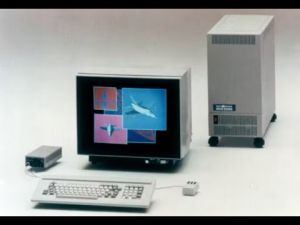68k-based SGIs (IRIS Series): Difference between revisions
No edit summary |
No edit summary |
||
| Line 1: | Line 1: | ||
[[File:SGI IRIS 2400.webp|thumb|An IRIS 2000 owned by System Source]] | |||
The earliest SGI systems were 68000-68020 powered graphics terminals and workstations running [[GL2]], a System V UNIX with an unusual for the time focus on graphics. Multibus standard powered machines, they were similar to Sun Multibus systems in many respects. | The earliest SGI systems were 68000-68020 powered graphics terminals and workstations running [[GL2]], a System V UNIX with an unusual for the time focus on graphics. Multibus standard powered machines, they were similar to Sun Multibus systems in many respects. | ||
They were replaced by the [[Professional IRIS]] series of systems. | They were replaced by the [[Professional IRIS]] series of systems. | ||
=== IRIS 1000 and 1200 === | |||
[[File:IRIS 1000 Terminal.jpg|left|thumb|An IRIS 2000 Terminal]] | |||
The 1000 and 1200 computers used a Motorola 68000 microprocessor clocked at 8 Mhz and were sold as diskless systems intended for use as a terminal to a VAX system. The mainboard in the IRIS 1x00 machines is of Sun origin, existing before the founding of Sun Microsystems. | |||
=== IRIS 1400 and 1500 === | |||
The 1400 and 1500 were equipped with a 10 MHz Motorola 68010 microprocessor, 1.5 MB of RAM and supported ST-506 or SMD drives. IRIS 1400 and 1500 used [[GL2-1.x|GL2 operating system]], Version 1. It uses a Geometry Engine VLSI GPU and 8-bit graphics planes of 1024x1024 memory. Additional memory, a floating point unit and a faster CPU were available. | |||
=== IRIS 2000 Series === | |||
The IRIS 2000 series includes the 2000 and 2200 terminals and the 2300, 2400 and 2500 workstations. These use the PM2 multibus board with a Motorola 68010 clocked at 10MHz. The SKYFPM-M-03 is an optional FPU board for these systems. These systems supported a max of 2MB of RAM. | |||
=== IRIS 2000 Turbo === | |||
The 2300, 2400 and 2500 were later updated with a Turbo board, which used the IP2 68020 CPU at 14MHz and the FP1 floating point accelerator. They supported a max of 16MB RAM. | |||
=== IRIS Graphics === | |||
The IRIS Graphics system uses VLSI Geometry Engines and lacks any support for texturing. Within each GE is: | |||
* 4 Matrix Engines | |||
* 4-6 Clipper Engines | |||
* 2 Scaler Engines | |||
[[Category:Hardware]] | [[Category:Hardware]] | ||
Revision as of 22:10, 20 February 2025
The earliest SGI systems were 68000-68020 powered graphics terminals and workstations running GL2, a System V UNIX with an unusual for the time focus on graphics. Multibus standard powered machines, they were similar to Sun Multibus systems in many respects.
They were replaced by the Professional IRIS series of systems.
IRIS 1000 and 1200

The 1000 and 1200 computers used a Motorola 68000 microprocessor clocked at 8 Mhz and were sold as diskless systems intended for use as a terminal to a VAX system. The mainboard in the IRIS 1x00 machines is of Sun origin, existing before the founding of Sun Microsystems.
IRIS 1400 and 1500
The 1400 and 1500 were equipped with a 10 MHz Motorola 68010 microprocessor, 1.5 MB of RAM and supported ST-506 or SMD drives. IRIS 1400 and 1500 used GL2 operating system, Version 1. It uses a Geometry Engine VLSI GPU and 8-bit graphics planes of 1024x1024 memory. Additional memory, a floating point unit and a faster CPU were available.
IRIS 2000 Series
The IRIS 2000 series includes the 2000 and 2200 terminals and the 2300, 2400 and 2500 workstations. These use the PM2 multibus board with a Motorola 68010 clocked at 10MHz. The SKYFPM-M-03 is an optional FPU board for these systems. These systems supported a max of 2MB of RAM.
IRIS 2000 Turbo
The 2300, 2400 and 2500 were later updated with a Turbo board, which used the IP2 68020 CPU at 14MHz and the FP1 floating point accelerator. They supported a max of 16MB RAM.
IRIS Graphics
The IRIS Graphics system uses VLSI Geometry Engines and lacks any support for texturing. Within each GE is:
- 4 Matrix Engines
- 4-6 Clipper Engines
- 2 Scaler Engines